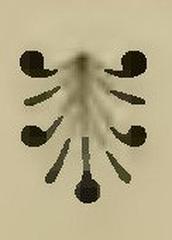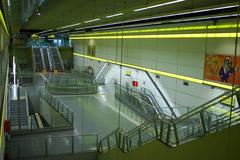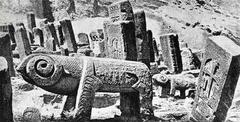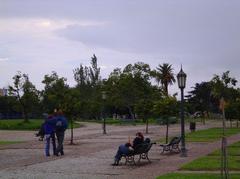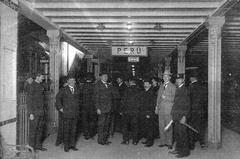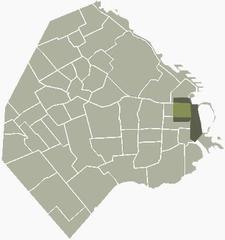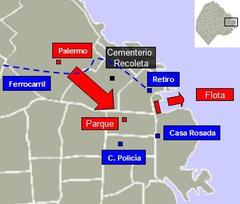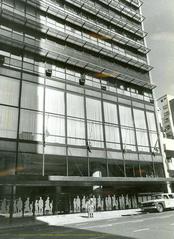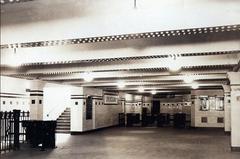Visiting Jardín Japonés in Buenos Aires: Hours, Tickets, and Tips
Date: 16/07/2024
Introduction
Nestled in the heart of Buenos Aires, the Jardín Japonés stands as a serene oasis and a testament to the enduring friendship between Japan and Argentina. This meticulously designed garden, inaugurated in 1967 to commemorate the visit of Japanese Crown Prince Akihito and Princess Michiko, encapsulates the essence of Japanese aesthetics and philosophy. Designed by Yasuo Inomata, a renowned Japanese landscape architect, it features classic elements such as koi ponds, stone lanterns, and bonsai trees, all arranged to evoke a sense of peace and contemplation. As a cultural landmark, the Jardín Japonés not only offers a tranquil retreat from the bustling city but also serves as a hub for cultural exchange, hosting various events and workshops that promote Japanese traditions and philosophies. This comprehensive guide will provide you with all the essential information you need to plan your visit, from operating hours and ticket prices to travel tips and nearby attractions.
Table of Contents
- Introduction
- Origins and Establishment
- Design and Architecture
- Cultural Significance
- Symbolism in the Garden
- Historical Events and Milestones
- Visitor Information
- Educational Role
- Preservation Efforts
- Visitor Experience
- Nearby Attractions and Travel Tips
- FAQ
- Conclusion
Origins and Establishment
The Jardín Japonés in Buenos Aires, Argentina, is a symbol of cultural exchange and friendship between Japan and Argentina. Inaugurated in 1967 to commemorate the visit of the Japanese Crown Prince Akihito and Princess Michiko, this event marked a significant milestone in the diplomatic relations between the two nations, fostering a deeper cultural understanding and appreciation.
Design and Architecture
The design of the Jardín Japonés is a meticulous representation of traditional Japanese garden aesthetics, embodying principles of harmony, tranquility, and natural beauty. Yasuo Inomata, a renowned Japanese landscape architect, designed the garden. It features classic elements such as koi ponds, stone lanterns, and meticulously pruned bonsai trees. The layout is intended to evoke a sense of peace and contemplation, characteristic of Japanese garden design.
Cultural Significance
The Jardín Japonés serves as a cultural bridge, offering visitors a glimpse into Japanese traditions and philosophies. It hosts various cultural events, including tea ceremonies, ikebana (flower arranging) workshops, and traditional Japanese festivals like Hanami, the cherry blossom festival. These events are crucial in promoting cultural exchange and understanding between the Japanese and Argentine communities.
Symbolism in the Garden
Every element in the Jardín Japonés is imbued with symbolic meaning. The koi fish in the ponds represent perseverance and strength, while the stone lanterns symbolize enlightenment. The bridges, often painted red, signify the transition from the mundane to the sacred. These symbols are integral to the garden’s design, providing visitors with a deeper appreciation of Japanese culture and philosophy.
Historical Events and Milestones
Over the years, the Jardín Japonés has been the site of numerous significant events. In 1991, it was the venue for the celebration of the 100th anniversary of Japanese immigration to Argentina. The garden has also hosted visits from various Japanese dignitaries, further solidifying its role as a symbol of bilateral relations. In 2004, the garden underwent a major renovation to enhance its facilities and preserve its historical elements.
Visitor Information
Visiting Hours
The Jardín Japonés is open daily from 10:00 AM to 6:00 PM. However, hours may vary on holidays, so it is advisable to check the official website for updates.
Tickets
General admission tickets cost approximately ARS 290 for adults. Children under 12 and seniors over 65 can enter for free. Special rates may apply for group visits and educational tours.
Accessibility
The garden is wheelchair accessible, with well-maintained pathways and ramps ensuring that all visitors can enjoy the serene environment.
Educational Role
The Jardín Japonés is not just a place of beauty but also an educational resource. It houses a library with a vast collection of books on Japanese culture, history, and language. The garden also collaborates with local schools and universities to offer educational programs and workshops, fostering a deeper understanding of Japanese traditions among the younger generation.
Preservation Efforts
Maintaining the authenticity and beauty of the Jardín Japonés requires continuous effort. The garden is managed by the Fundación Cultural Argentino Japonesa, which oversees its preservation and maintenance. The foundation organizes fundraising events and collaborates with Japanese experts to ensure that the garden remains true to its original design and purpose.
Visitor Experience
Guided Tours
Visitors to the Jardín Japonés can immerse themselves in a serene environment that contrasts sharply with the bustling city of Buenos Aires. The garden offers guided tours that provide insights into its history, design, and cultural significance.
Dining Options
The on-site restaurant serves traditional Japanese cuisine, enhancing the overall cultural experience. The restaurant offers a variety of dishes, including sushi, tempura, and ramen, all prepared with fresh ingredients. The restaurant’s design and ambiance reflect Japanese aesthetics, providing a serene dining experience.
Nearby Attractions and Travel Tips
Travel Tips
Wear comfortable walking shoes and bring a camera to capture the garden’s beauty. Early morning or late afternoon visits are recommended to avoid crowds.
Nearby Attractions
After visiting the Jardín Japonés, you can explore nearby attractions such as the Palermo Woods, the Buenos Aires Eco Park, and the Museum of Latin American Art of Buenos Aires (MALBA).
FAQ
Q - What are the Jardín Japonés visiting hours? A - The garden is open daily from 10:00 AM to 6:00 PM.
Q - How much are the Jardín Japonés tickets? A - General admission costs approximately ARS 290 for adults, while children under 12 and seniors over 65 can enter for free.
Q - Is the Jardín Japonés wheelchair accessible? A - Yes, the garden is wheelchair accessible with well-maintained pathways and ramps.
Conclusion
The Jardín Japonés is more than just a garden; it is a cultural landmark that fosters a deeper understanding and appreciation of Japanese traditions. Whether you’re interested in its historical significance, cultural events, or simply looking for a peaceful retreat, the Jardín Japonés offers a unique and enriching experience. For more information, visit their official website and follow them on social media for the latest updates and events.


























